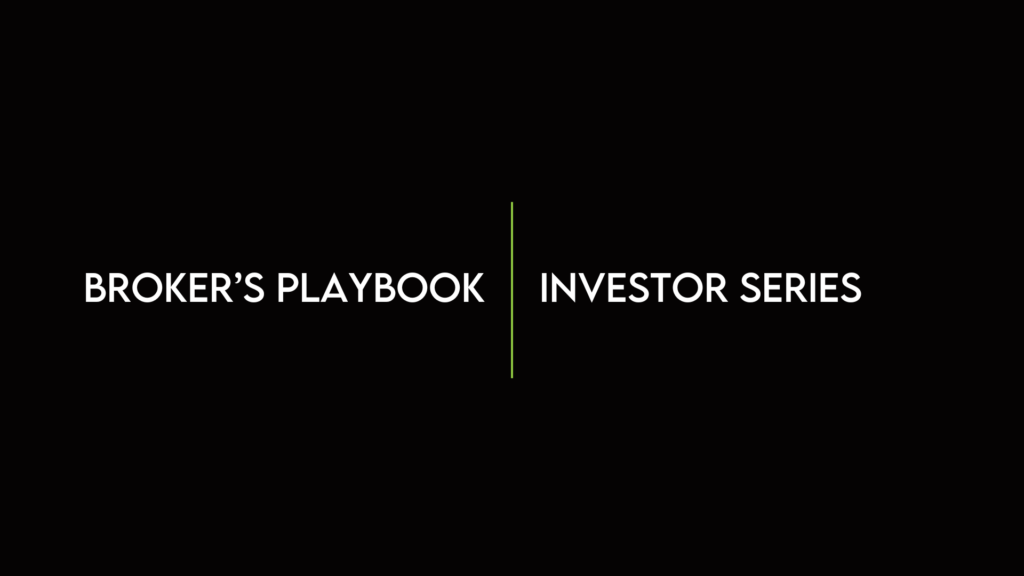Welcome to Broker’s Playbook! Today we’re talking about how to use the Broker’s Playbook platform, with our COO, Bobby Puim. Hear about how Simeon and Bobby are transforming investment real estate in this country, and what’s going on in this exciting space. Learn about our unique approach and innovative ideas that could be game-changing.
Simeon Papailias: All right, boys and girls, coast to coast. Welcome to another episode of Broker’s Playbook Podcast. Today is the day that I have Bobby Puim, my very own director of operations. He has been working with the REC team, which is our real estate transacting arm. That is my real estate business, along with my partner Jas Takhar. And Bobby has been running our team operations and growing our team operations since he came on board. Believe it or not, in March 2000, a very epic time in all of our lives and of course, our business. Mr. Bobby Puim, welcome to Broker’s Playbook. Thanks, Big Guy.
Bobby Puim: I think you gave me a little extra credit. I think you said March 1st, 2000. It was 2020, though, which would have made it pandemic times, not that I’ve had to put up with you for 20 years. 23 years.
Simeon Papailias: Now. Well, considering I’m only 29 years old.
Bobby Puim: It would have.
Simeon Papailias: Been tough. There’s no way that you could be with me for 23 years. No, You joined us in. In actually, you actually joined us in January. Yeah. Kind of volunteering and being around the office, kind of familiarizing yourself with what we are and what we weren’t. And then in March, we decided that it was a great idea to bring you on. And of course that really has been one of the best decisions we’ve made as a business for you to join us in growing our company. Um. I want to talk about a few things. I want to talk about. Broker’s Playbook. Broker’s Playbook specifically is a company that. You and I started. At the very beginning of the pandemic?
Bobby Puim: Yes, sir.
Simeon Papailias: We haven’t told the story of broker’s playbook ever before. Um, with an actual intent of letting everybody know what the platform is and what it’s not, how to use it, when to use it, etc. So today I really want to kind of break the silence on the platform. We have turned what was once a simple idea into something that I think may change the trajectory of how we transact investment real estate in this country.
Bobby Puim: We definitely have designs on it.
Simeon Papailias: And we’ll speak to it in time. But tell me from your from your eyes, from your lens. Why did we start Broker’s Playbook?
Bobby Puim: I love the question. I remember sitting in the house, you know, what was it like March 15th, March 17th of 2020?
Simeon Papailias: March 17th is the way it all went down. Yeah. So it would have been March 18th. 18th.
Bobby Puim: I was sitting in the house. Right. And and we were working to solve some some agent problems. Part of the operational side of working with Canada is that the agents have gaps in their business. So how can we place a system there, a process there in order to fill the gaps of what they’re going through on a day to day basis? And when you and I got to talking like it’s everything shut down, everybody stayed home, everybody was scared. So how do we how do we send the message to everybody all at once? And it started as a pretty simple idea. It was, Well, let’s do a podcast then. Jas had been with the experience for many years and we thought, let’s get our voices out there as well. So we sort of just started. We put it together with some people that we knew and loved, and we tried to make the industry a bit better place by utilizing, what was it then your 15, 17, 18 years of experience in this business to to go outbound and make sure that people knew that they were going to be okay. From there, though, it evolved into people wanted to work with us and we had to find a way to make that happen. As much as I would love to recruit every agent in Ontario, in Canada, to be a part of the Canada team, it’s unscalable, it’s unviable.
Simeon Papailias: So I think just to to go back one step, I remember those early days. The podcast was born as a result of the pandemic. So we see the pandemics coming. At the time, we had just under 25 people on the team, 22, I believe 22, Yeah, we had 22 people on the team. And as of tomorrow, you can no longer see anyone. We can’t see our administration staff, we can’t see our our team agents. So. We quickly put together kind of a some thoughts around it. At the time, Laura Martin was was was part of it. And she is an incredible human being. So when we started this off, Laura, who is a mortgage broker, felt the exactly, exactly the same for her community. And they’ve got.
Bobby Puim: A huge team over Matrix.
Simeon Papailias: Massive Matrix global Sean Allen’s.
Bobby Puim: Outfit Yeah.
Simeon Papailias: Outfit and Laura is the chief operating officer. I’m not sure if she’s a chief operating officer now. I think she’s still growing the actual brand with franchisees. She’s doing big things anyways. But at the time when we started it, she wanted to find a way to stay connected with her industry people, and we wanted to find a way to stay connected and grow, of course, and mindshare with our industry people. So, so that’s kind of where Broker’s Playbook was born. And in those early days and I don’t know who remembers and how everybody was involved, clubhouse was was a thing revolutionary audio share where you have rooms, there’s speakers you can listen, you can contribute or not. But that is the time that we really blew things up from a reputational perspective. And the only thing we did is kind of speak our everyday truth.
Bobby Puim: And people were asking us to be on there all day, every day, every day. It was wild. I think the best part of that was that neither of us needed to shave for an entire year. It was incredible.
Simeon Papailias: It was pretty.
Bobby Puim: Good. We still got our message out.
Simeon Papailias: It was pretty good. And the truth of the matter is it was a way and I truly enjoyed it. And I still do. That’s why we’re here right now. Um, I enjoy sharing my insight. I feel good when somebody tells me that the the tip you gave me worked out. And of course, vice versa. I’m always and I’ve said this a million times, I’m a student of the game. There’s not a time that I’m going to have a full conversation. I think I was just speaking to Andrew Perrie a couple of weeks ago. We were just talking about exact same thing. No matter who you’re talking to, it could be your seven year old son or somebody. You’re going to learn something. Something’s going to make you think.
Bobby Puim: And the clubhouse thing was then connecting that. Yeah, it was connecting us with individuals in Vancouver, the same as it was in Florida, San Diego, everywhere, everywhere.
Simeon Papailias: It was hearing different problems in different markets and.
Bobby Puim: They all happen to be similar problems.
Simeon Papailias: But they had restrictions. They didn’t have restrictions. They had that restriction. Yeah, people reacted differently to different things. So yeah, it gave us a lot of insight and it grew our our channel per se quickly.
Simeon Papailias: Uh.
Simeon Papailias: What I noticed happened right after. And you, of course, felt it all because the workload actually came on your desk is when people saw that my partner, my business partner and I are still banging out the exact same amount of business. Oh, yeah. Before the. The world was closed to. After the world is closed, people took notice.
Bobby Puim: They absolutely did.
Simeon Papailias: And what we did at the time is what we always do with everything. We move quickly and we pivot quickly. So I hate the word pivot because it was rinsed during the pandemic. Same with unprecedented and all the the nonsense. But when other people sit there and plan myself and my partner and you and Laura and our entire executive team, we make moves.
Bobby Puim: It’s the old adage at the office. I believe that we’ve got a sign here somewhere in this office that says, Ready, Fire, Aim. Yeah. We were ready.
Simeon Papailias: We live it every day.
Bobby Puim: We live it. So. So we just sort of worked backwards from the things that we knew were going to work. And you were right. Like it did land on on this side of this table because because everybody wanted to do business the way that you guys were doing business in that moment in time.
Simeon Papailias: So. So to cut the long story short, we turned all our seminars or workshops or wine and cheeses to digital format We adopted. We were one of the first adopters to zoom. We tried three platforms in a matter of 30 days.
Bobby Puim: The very first thing that I did in January of 2022 was get on the phone with Zoom at Jas’ behest. Yes, I remember it vividly. We opened up an account there and then we tried Cisco. What was Cisco’s.
Simeon Papailias: Name? Oh, it’s a big one. Webex. Webex. Webex. It’s one of the biggest ones. Yeah.
Bobby Puim: We went through Google meets and we went through, remember Skype? How did Skype lose all that market share? It is what it is. Wild, right?
Simeon Papailias: It’s wild. But yeah, we had massive interviews for capacity, meaning that we weren’t looking for a package to save that we log into the same account. We’re asking them for enterprise solutions because we knew that we need an at scale thing webinar, call it meeting, call it whatever you want to call it, Google Meet. We need a capacity. We needed recordings, we needed proof. We needed if we’re doing deals via via virtual channels, which was unheard of. Docusign had barely been allowed to be used. It’s true. So so we’re talking about three years ago and the last three years before that is when the whole digital signatures is it allowed, Is it not allowed? All the things. So just because it’s commonplace now doesn’t mean it was commonplace three years ago. We saw people reach out to say, how did you do 18 deals at the 900 or the development? This is a nice little shout out to the 900 sub team. But. For for doing deals at the 900 or any other development. How did you do it? And we told them, well, it’s what we always do. We believe in education and we invite our database and we have a team of inside, inside salespeople who make calls on our behalf. And me and my partner also make calls. And we invite our people in to learn how to win using real estate as a tool. And they’re like, okay, well, it sounds simple. It can’t be. No, it’s not simple. It’s a lot of hard work. There is hundreds of calls being made daily to invite people into a room where you get 50 or 100 people. You sit in front of the room and you break down real estate as an investment. If you’ve never done it before, I can show you how to do it. Well, we found ourselves having that conversation six times a day every day.
Bobby Puim: If it if it wasn’t a dozen times.
Simeon Papailias: If it wasn’t a dozen times in that in that that’s when, you know, me being nice and generous with my time became a problem.
Bobby Puim: It just became unscalable again. We found the same issue over and over and over again. This is simply unscalable for us.
Simeon Papailias: So what we did do in the essence of Broker’s Playbook now, because I went from a podcast and still a podcast, of course, to an ecosystem and and we’ll talk maybe towards the end of this if we so see fit, we’ll talk a little bit about what the future holds because there’s big things on the cook. Broker’s Playbook today.
Bobby Puim: Yeah.
Simeon Papailias: Is a collaboration platform online. It can be found at brokersplaybook.com. How does somebody Bobby use the platform? Is it. Is it the podcast? Is it training? Is it. Is it the deals? Give me a logical sequence and path.
Bobby Puim: Yeah, I think it all starts with the podcast. It’s an extension of what we talked about from before with clubhouse. We’ve continued onward with it and we try our best to bring as many thoughtful leaders in this business onto the podcast as we can so that our listenership can learn from the best in the business, the most thoughtful people, the best in the business. Take a playbook away and make it your own.
Simeon Papailias: Give me an example of that.
Bobby Puim: Once Andrew Perrie a couple of weeks ago, he opens up his branches of Revel, his brokerages, if you will, and then recruits in a different way. Family First team, this all of the little things that everybody says that they want to do. And then he’s raw with with the audience about how difficult it actually is. I would go back to like Kaylee Heaps is an incredible interview as well. Who is Cailey? Cailey Heaps the the the number one earner at Royal LePage Canada.
Simeon Papailias: Number one earner for Royal LePage Canada. Almost a decade straight. Yeah.
Bobby Puim: It’s wild. She’s incredible. One of my favorite people. And for her to break down her business to somebody who’s been in the business for one year, one month, ten years, but hasn’t reached a goal that they want, is exactly what Broker’s Playbook is meant to provide. But again, like you can only listen to so many things. I love Freakonomics Radio. It doesn’t make me an economist. Where Freakonomics falls short, however, is that at brokersplaybook.com. You can also then access you as a trainer.
Simeon Papailias: So I think this is where it gets confusing and this is where I want to do a really good job cleaning this up. We started a podcast. We feature every single amazing. Accomplished broker. In the business to share their insight. That’s the Playbook. Yes. So if you want to hear what Andrew Perrie did in his doing brokers playbook.com/andrew Perry, for example, we’ll get you there. So go to the podcast, go to Spotify, Apple, whatever.
Bobby Puim: 67 episodes for you to check.
Simeon Papailias: Out. Number two training. Um, we have been assisting other teams at Royal LePage for years. Royal LePage is a phenomenal organization. That’s the brokerage that we chose to partner with 18 years ago, and we’re still here today. Uh, whether you’re at Remax, whether you’re a Royal LePage, whether you’re a Keller Williams, EXP, we frankly have zero thought around where you feel you get your value proposition as a brokerage.
Bobby Puim: Those are your choices to run your business.
Simeon Papailias: But what is not different anywhere is the appropriate training systems. So what? And this isn’t something that Royal LePage gave me. This is something we created for within our team requirements. Royal LePage provides a million things, as does everyone else, for that matter. I’m not doing this isn’t a brand thing. I’m talking about what we’ve created at Broker’s Playbook is brand agnostic and it’s there to help everyone. And we took we made a partnership with one of the best trainers on the globe, Verl Workman excuse me. He’s out of Salt Lake City, Utah. And I liked how raw.
Bobby Puim: Absolutely.
Simeon Papailias: In traditional.
Bobby Puim: Fundamental.
Simeon Papailias: It’s not traditional, fundamental and raw. His methods are because. I know who I am. I don’t need to be told if I’m raw or fundamental. Yeah, I do believe that I can out work anyone, and that is as fundamental as it gets. I didn’t say I’m smarter than anyone, better looking than anyone, but the chances of you outworking me are slim to none because I’m crazy like that. So if you, as a broker, identify as a hard worker or as someone who’s willing to try anything, anything, I will try. And I never fail because I learned something. And call it cliche. Call it cheesy. Corny. I don’t care. I fail nine times a day to win once. I learn nine times a day, which is why I continue to win. And that’s all coming from a place of arrogance. It’s coming from a place of I fail all day knowing that I’m learning a lesson. I know what I now know what doesn’t work.
Bobby Puim: That’s our fundamental truth here.
Simeon Papailias: That’s our fundamental truth.
Bobby Puim: And. The reason that we broached the training as a whole. So go back to it. The podcast was generating a bunch of people that then said that they wanted to work with us and we are clueless in this field as to what everybody else knows. We know what we know. We know that I’m going to try my best to work as hard as you. I know that I’m going to be made fun of by Cristina, our assistant, every day, because I’m off on a vacation learning something new. That’s what she says. I got to go to the bank and open up a corp, but I’m not going to learn anything.
Simeon Papailias: I know that my business partner is probably having a drink with my visa right now. Exactly. There’s fundamental fundamental.
Bobby Puim: Truths to the world. But all kidding aside, what we knew, what we knew here, we didn’t know what our agents knew at that particular point, and we were tired of taking their word for it, I suppose.
Simeon Papailias: So we’re talking like when, when when did it go down?
Bobby Puim: Yeah, and it went down because let’s make sure that everybody is on the same page as their team leads. Let’s make sure that they are out in the world doing the right things. But what we also learned along that.
Simeon Papailias: Way, why don’t we make that a little bit cleaner? Sure. End of 2021, 2021 was the biggest year in Canadian real estate history. Our team had its record and banner year, but December 1st after November 30th, which is Roy LePage’s closing for numbers mean you were looking at some reports Yeah we were and what we found it was not pretty. It was not nice. We have grown our team from when Bobby started to at that time we were probably at about 45 agents. Yeah. And if 2021 so we.
Bobby Puim: Doubled it over a 18 month period or so, month period.
Simeon Papailias: But more importantly, we found a disparity. We found that although we had our best year ever, no reason to complain, no reason to to to squawk. We looked at our 45 roster and we saw that almost 2018 people for that matter. Did not hit $150,000 in GCI. In 2021.
Bobby Puim: Banner year in real estate.
Simeon Papailias: The year that arguably that you couldn’t cross the street without two people asking you if you can get them a property. So I want that let like I really want to unpack that and let it sink in because we go on a Zoom call in January. But he’s back from holidays. We’re saying, congratulations, everybody, Everybody, you know, had a good time. Happy New Year. 22 is upon us. Everybody still thinking that, you know, the world is going to continue to be what it is. But as we all know, 2022, by February, the world kind of got tossed on its on its head, to say the least.
Bobby Puim: In our marketplace. At least it did.
Simeon Papailias: But in January, before it got tossed on its head, we were on a Zoom call for a Zoom call of the year. And very simply put, I kind of lost my marbles on that call.
Bobby Puim: Yeah. And I think it stems from a conversation that that you and I had just before. That’s correct. We always take that that Christmas break to be able to break down what are the 15 things we’re going to accomplish this year? We work harder during that week to.
Simeon Papailias: Patch the holes for next.
Bobby Puim: Year. Exactly. And the the conversation that we had was I remember this just a little bit differently than you do. I was privy to a conversation right from some of those exact team members that didn’t hit one of the easiest markers in the world to hit that there wasn’t enough training, there wasn’t enough support somehow with the team or the dedicated director of operations to build these things. I took that personally.
Simeon Papailias: So did I.
Bobby Puim: And that’s why we lost our minds in January.
Simeon Papailias: So so the truth of the matter is we brought people on who said, I said, Hey, how long have you been in the business? Three years. Two years? Four years? Do you know how to real estate? Oh, I’m the greatest real estate agent of all time. Yeah, great. Are you going to be able to work leads that I give you? Et cetera. Oh, absolutely. We give them one, we give them two. They don’t close deals aren’t coming in.
Bobby Puim: Not only do they don’t close Simos, they weren’t tracked. We said, no problem, they’re going to drop into your CRM. We use core.
Simeon Papailias: They logged in four times and completed 18% of the tutorial.
Bobby Puim: They didn’t even log in. And this isn’t a criticism like everyone don’t take it that way. It’s. We identified a gap in the business and.
Simeon Papailias: No gap in our business, meaning that we believed people will do the things to our satisfaction. Yes, it’s on us 100%.
Bobby Puim: It’s on.
Simeon Papailias: Us. Not only are we not blaming that is so when we lost our marbles and I said, this will never happen again, ever, ever. Because what’s going to happen is I’m going to control and know what you know about real estate. And that’s when. And this created.
Bobby Puim: The same lesson smacked us in the face. How do we make that scalable? It isn’t scalable. When your team lead, one of the two figureheads in your organization are then ripped away from their day to day and have to spend X number of hours, minutes, days setting these things up to make sure that the team can succeed. If we were going to do it once, we were going to do it exactly that number of times and we were going to place it in into a place for the betterment of everyone.
Simeon Papailias: Yeah, in the future of the team, like we can use this again and again. So we created a very comprehensive that was a very long way to bring. But, but I mean, it’s the truth. I like sharing the story because I really love it every time. Um, and it’s fun. We created a 12 week all encompassing soup to nuts.
Bobby Puim: Fundamental real estate training.
Simeon Papailias: Program, how to real estate, how to.
Bobby Puim: Real estate.
Simeon Papailias: We found funny enough that it’s not for juniors, it’s for juniors too. But depending on where you’re at your path, whether you’re in year one or year six, the year six agent takes something completely different out of it. The we’ve had chairman level people take the course with their entire teams. At this point. The chairman took something out of it. Obviously, I don’t need to tell a legend in real estate. Amy Flowers. Pick up the phone. Pick up the phone or how to do an open house. Right. She is the queen of Milton for a reason, but she got other stuff out of it. Like how I look at a listing appointment versus how she looks at a listing appointment, how we do A, B or C versus time blocking versus so if you move your 9:00 to 11 on a consistent basis, you open up two hours of uninterrupted personal time for that matter. Yeah, because different levels value different things.
Bobby Puim: But even even more impressive, I think, is that Amy identified it almost immediately. If we’re going to stick with the Amy example, that adding a pillar to your business is also a very doable thing based on what we were then able to implement from the fundamental training. I am.
Simeon Papailias: So let me finish my sentence. So what all I’m trying to get at is the training that we’ve created is for the rookie, for the intermediate and for the senior difference being is that the rookie is going to learn how to real estate, like figure out why the heck they even exist. The intermediate is going to solve for half their life’s problems by understanding that they’re not the only people who have fought this uphill battle before. And the senior is going to pick a few two, three, 4 or 5 items that are going to change their lives because we have had some mentoring from some of the best minds in the business. Yes, sir. And I believe we’re doing well as a result of the efforts of everyone around us.
Bobby Puim: Couldn’t agree.
Simeon Papailias: More. I’m not taking credit for what we’ve created. I will take credit for it, for my contribution to it. But we’ve had a lot of tremendous influence. You mentioned collaboration.
Bobby Puim: Yes, sir.
Simeon Papailias: We have truly redefined it.
Bobby Puim: I think we have.
Simeon Papailias: I know we have. And I’ve been told every day we have by the people I respect the most. I’m not going to be humble about this. We have written over. 250 deals in the last two years. Using Google drives.
Bobby Puim: A lot of hustle.
Simeon Papailias: A whole lot of hustle, only to prove a business case. Yes, sir. A business case. That collaboration is not only something that can exist in a dog eat dog world of real estate, Not only can it be celebrated, it is real. We have created well over $5 million in commissions. And. Those funds have been distributed amongst. The workers. The brokers, the client incentives, all the things that collaboration needs to be and stands for. We have successfully proven to the world that it can be done. I want you to explain at least two different ways of collaboration. Maybe we’ll touch on three. Let’s do. Income property and sharing our haves and wants. Let’s do. New construction collaboration. And let’s do. Promotion of mindshare in podcast. Because those are collaborations.
Bobby Puim: They absolutely are.
Simeon Papailias: So when you hear this show today, I’ll speak to the first I’ll speak to the podcast. Sure. You speak to new construction. Okay. All right. So you’re hearing this podcast right now. If you feel. That you have something to contribute. That all of us, including myself, will benefit from. You do not stay quiet. Push your screen up, open a new window and write us a message to community at brokers playbook.com. Even better, you can go.
Bobby Puim: To the website brokersplaybook.com and select podcast from the home menu, and there’s a place for you to book a time to meet with one of the two of us. Yeah, to chat about what you would like to bring to the podcast.
Simeon Papailias: Or who you would like to hear on the podcast if you want to hear, I don’t know Gary or Grant Cardone or all.
Bobby Puim: Of it is relevant.
Simeon Papailias: Who makes you happy? Tell us who makes you happy so we can get you on. And that’s the Broker’s Playbook content collaboration from adding a new vertical. Now let’s talk money because a lot of people get excited for that. Yeah. Tell me a little bit about Broker’s Playbook, new construction collaboration. How does that work?
Bobby Puim: I think that it starts with an overview of how the pre-construction business works at Canada, to be honest with you. And I sit.
Simeon Papailias: Only because this is coast to coast. We’re referring to GTA. Yeah, specifically Ontario specific. So if you’re in BC or Alberta, it might be a bit different. But here out how we’re banging out deals with our colleagues here. Yeah.
Bobby Puim: And I think that if you’re in B.C., Alberta, Quebec, we see your projects too. That’s where I’m going to start.
Simeon Papailias: You know what? You’re right. It’s national.
Bobby Puim: Our. Our desks sit ten feet apart between the two of us. We have I’m just going to say 200 projects a year that land on those desks. Not all of them are created equal. But value somewhere. So a portion of what I do on a day to day basis is work to vet some of those things. Who’s the builder? How well capitalized are they? What are they bringing to market? When are they bringing it to market? All the little things.
Simeon Papailias: Are they paying? What incentives do they have for their clients.
Bobby Puim: All the way down the line? And like I said, they’re not all created equally. So some of them don’t pass the eye test and lots do.
Simeon Papailias: And some of them don’t pass the pro forma test.
Bobby Puim: And then some do. Yes. As we go down the line, Jas and Simos with Canada will identify anywhere between 5 and 8 projects a year that they say that they’re going to get loud about. It’s a very and.
Simeon Papailias: That’s because they pass the eye test and the performer test and.
Bobby Puim: There’s a relationship there and they know that they could take it to their databases at any particular point and win for the investor first. That’s the first lesson. Next, though, is that jazz and seamless are only two men and they’re only going to do 700 deals a year. And they’re going to do those 700 deals on the backs of 10,000 available units across those 200 projects annually. Our team, the Canada team, 45, 47 agents strong. You’re going to do another 150 to 200 of those deals. If I rounded right and just gave myself easy math, we’re sitting on 9000 units that happened across our desks in any particular year that passed the eye and perform a test. That, then go unserviced. In theory, there are many other agents that work in pre-construction.
Simeon Papailias: I want to use an example because I like where you’re going with this. I want to use an example. This is actually this hat that I’m wearing today only because it matches my shirt. Happens to be the 900 by Haj developments and.
Bobby Puim: Like quick quick.
Simeon Papailias: Show. Can I talk about this.
Bobby Puim: Quick shout out though. Right like Harhay developments always gives you a gift, but old Bobby here has to sit in the office with no hats.
Simeon Papailias: This is actually your hat that they. They told me to bring Bobby a hat.
Bobby Puim: And now you’re wearing it, bro.
Simeon Papailias: Listen, listen, listen.
Bobby Puim: Harhay developments.
Simeon Papailias: I want to use this as an example. Yeah, because this is live right now. So we’re sitting here at the at the studio. I wore this hat because it matched my outfit. But it turns out that this is a perfect example. For what? For for collaborations. So the 900 is three Phase three Tower Development Master.
Bobby Puim: Plan, Community.
Simeon Papailias: It’s called the 900 because of its address on the East Mall. It’s right by the airport. By the airport, very close to the airport. And they’re building a master plan community with about 900 units, three towers of about 300 units in each one. So it’s kind of smart and as far as a marketing campaign is concerned. So. For the 75,000 agents on TRREB or OREA in Ontario. Whatever the numbers are, the obscene numbers of realtors. Yeah, I can tell you that 99% of those realtors have never either. Never sold a pre-construction unit. Yes, sir. Don’t care to learn how because they’ve heard it’s insane and it pays in four years.
Bobby Puim: That’s a that’s a bigger problem.
Simeon Papailias: Complete ignorance and misconceptions is is what rattles the industry. Yes, that’s what we’re looking to change. So. A resale agent wants to be able to do a deal and get paid like a normal human being. Construction is a little bit different. Yes, it is. You get paid two and three different times.
Bobby Puim: Yep.
Simeon Papailias: Sometimes twice if you’re not careful, sometimes never. So it is a business in itself. It is something that me and my business partner Jas have worked for the last decade, 15 years. Our resell practice almost 20 years. But the point of the exercise is we’ve developed a network relationships. We’ve performed at the highest level. And now, for example, if I were to go to the listing brokerage for this development, in this case, shout out to Hersh Litvak and Hersh Realty and the entire family out there, I can call Hersh and tell him, Hersh I’m doing an event and I need 20 units. The industry being what it is being one of relationships. Hersh Litvak knows as a fact that if I ask for 20 units, I will sell 20 units. So he trusts me.
Bobby Puim: That doesn’t come overnight. That’s truly 15 years worth.
Simeon Papailias: And that’s true of grind. Something that’s able and available to 1050, 100, 200, 500 brokers in all of Ontario out of 75,000. So it’s 1% of the 1%. So with that being said, I’m not saying this to I’m special. I’m saying this is what I chose to focus on and we’ve gotten it. So for someone new to come in to do that, it’s very unlikely. Not because you can’t. Because it takes 15 years to do. Yeah. To develop relationships, to prove yourself, to sell again and again and have that kind of relationship. But if I can now let’s say, for example, for whatever reason, the seamless and jazz has to work on Bay Street condos today. And this launch is the same day. I can’t work this project. Do I break Hersh Realty’s hearts and say, No, I can’t work it? Absolutely not. Or do I call on my team members at the wreck, my own my own team to say, Hey, team, who wants to work the 900? We have an allocation. We have units. Do you want to work it? Well, one says, Well, I’m on vacation in Jamaica, okay? The other one says, I’m at my grandfather’s wedding that weekend or what have you. That’s a little weird. Maybe it’s a great example. Maybe the funeral. I don’t know. Look, I.
Bobby Puim: Look like your grandpa. I just got married. It’s the same thing.
Speaker3: You’re hilarious.
Simeon Papailias: So the bottom line is how this all evolved is I went outbound. Yeah. And when brokers playbook podcast, everybody’s calling in, they’re like, well, how do how can I sell five units on a Saturday? I’ll tell you how you can sell it. You’re going to send an email to your database. You’re going to call every single person that you value and you’re going to tell them why the 900 or any condo that you believe in is a great project in this case. This is a great project.
Speaker3: Yeah.
Simeon Papailias: If you believe in the 900, you need to sell the 900 if you believe in condos. We just did a launch for Q Condos. Yeah, Live for real. So I’m able to assign my relationships inventory. To the platform. So an agent from Brampton. An agent from Mississauga. An agent from Vaughan, from Pickering. From Oshawa, from Barrie from Vancouver.
Bobby Puim: An agent from Cambridge, Montreal. Halifax.
Simeon Papailias: Pickett can go on brokers playbook.com right.
Bobby Puim: Now.
Simeon Papailias: Sign up for collaborations.
Bobby Puim: All you’ve got to do is go to the broker portal, enter your name, email and phone number and hit submit.
Simeon Papailias: You can log in, take a look at the assets.
Bobby Puim: And all of the assets you’re going to see would go harken back 2 or 3 minutes to what I was saying. The ones that pass both the eye test.
Simeon Papailias: Have you implemented the submit worksheets online? Of course.
Speaker3: Okay.
Bobby Puim: Of course.
Simeon Papailias: It goes to show you how connected I am to my own technology. I like it.
Bobby Puim: But when you when you enter your name, email, phone number, you’re going to hit submit. You’re going to declare that you’re a realtor broker. You can even send investors there. Everyone. Right? We’re not concerned with the investor and we’ll explain why.
Simeon Papailias: And who you you don’t touch the client. The agent puts in the client info.
Bobby Puim: It’s it’ll work like this. You’re going to get access via an email with the password in it.
Simeon Papailias: So tell me how an agent can submit a request for one of our units.
Bobby Puim: It’s beautiful. So like I said, name, email, phone number, hit submit. Within five minutes you’re going to have an email that comes from community at brokers playbook.com with a password for you to enter the broker portal. Once you’ve entered the broker portal, you’re going to see tiles, if you will. The tiles are the projects themselves. You’ll find the 900. Let’s stick on the example. You click on the 900 and you’re going to have the price list, the floor plans, any marketing materials that that particular project has put out for an agent to use. I think that this is like a quick tangent to this. An average realtor is going to have somebody drive by the 900 tomorrow and say, Oh, I think I want that. Yeah. And that agent isn’t going to know where to go. So they’re going to drive past the same place. There’s not going to be a sales office on site. They’re not going to know what to do, how to do it. They’re going to ask their broker. They’re not going to know because they’re at a different brokerage than we are. They’re going to ask an agent friend they may or may not know.
Bobby Puim: We’re not sure. Broker’s Playbook is literally meant to be so that you don’t even have to drive by the 900. You’re just going to have all of you’re just going to log in and get everything because tomorrow that same agent’s going to have somebody ask him about 123 Main Street condos and they’re going to have to drive down there, too, and the same rigamarole all the time. So now all of the assets are in one place for you to then send to your clients at your leisure. All of it, everything that you could ever want. Your client seamless then puts up their hand and says, Well, I want it like I definitely want. I love what I see. I love the pricing, I love the incentives that you manage to secure for me. Mr. and Mrs. Agent. And you say, Well, what the hell do I do now? Now there’s a green button on the platform that says Submit a reservation form. That reservation form is completely white, labeled. It could be for any project that we have available to us. And it’s all.
Simeon Papailias: Client safe assets.
Bobby Puim: All of it is client safe assets. So you could literally send an investor there. When they’re logging in, they declare that they’re an investor and then they’re required to put your name mister and missus agent next to it so that we never circumvent you. We don’t want to. Our relationship is with the broker. That’s why it’s Broker’s Playbook. That’s the point.
Simeon Papailias: For for those who have never done this before, for those who have trust issues, it’s Tell me a little bit about the process. Um, you talk about circumventing.
Speaker3: Yeah.
Simeon Papailias: Um, how, how does an agent know and this is a true question. I don’t know if you have some feedback, how do the agents that we work with know that their clients are safe and or what process and guards have you put in place?
Bobby Puim: It’s a great question. I get this all the time, and I actually solved it for the Canada team. First, our own brokers, of course, right? It’s it’s our own house. The culture needs to remain as positive as possible and transparent. It’s crazy. So so what we do is at the moment that your client has submitted this reservation form, I would caveat that with your client probably shouldn’t be the one filling out the reservation form. You want to make this frictionless for your client, you should be the one doing it. But that’s neither here nor there. The moment that it’s submitted is the moment that in real time you, Mr. or Mrs. Agent, get a copy of that declaring that you have been declared the agent on this particular reservation form. And that’s that and that’s that. It doesn’t go to anybody but me. I am an investor first. So I take that reservation form and I go back to the 900 and I say, Hi, Hirsch and Team, we’ve got a reservation form for this.
Simeon Papailias: Bobby I think we’ve done a pretty damn good job in explaining our platform. Um, in, in summary podcast is live content every single couple weeks, new to drop. Somebody’s amazing always. I mean, it’s the pride and joy of my week. When I record a podcast, I know how involved you are in preparing all of us for them. Cristina with booking them, distributing and all the things. So that’s a lot of fun. Secondly, the training. If you are an agent looking to grow, reach out to the team. I can guarantee you a double deal count per year. And when I say guarantee you, if you do the work, if you can prove to me you’ve done the work and you don’t, I don’t want a penny from you. And I have giving. I have given this money back to no one because whoever has done the work has doubled or tripled their business. So this isn’t an advertisement. This is me speaking my truth because this is my program. We built this.
Bobby Puim: It’s so amazing to see. I love when you talk about it, what we.
Simeon Papailias: Call it, a challenge. It’s not a program. It’s the 12 week challenge.
Speaker3: And it it.
Bobby Puim: Actually changes the trajectory of somebody’s business if they’re willing to put the work in.
Simeon Papailias: So if you’re willing to work and you want to change your life, call me if you want a risk free written guarantee. Let me assure you that it’s available because I guarantee you if you do the amount of work that I ask you to do, you’re going to be in the half $1 million a year range. I don’t care what market you’re in, by the way, Winnipeg, Vancouver, Toronto, Ohio. It means nothing to me. So wherever you are, you put in the work. Lastly, collaboration. Yeah. This is a big one. Big, big, big one for resale agents to add a vertical to their business. Its investment focused real estate. We’re selling typically either new construction condominiums, townhouses or detached homes. At first pricing before they’re built to agents and their clients for use after the fact or to supply housing to the market. They log in, they access the units. We now have the ability to take the reservations inside the platform.
Bobby Puim: It’s all right there.
Simeon Papailias: That’s kind of what prompted us doing this podcast today. So that’s the biggest one. So that’s up and running. And as far as anything else surrounding the process, it’s just you are speaking to your client. We never speak to your client. We speak to you ever. You as an agent still have the duty to supply us your paperwork, your bras, all the things. Because for you to receive your payment, you have to have all your paperwork in line. That’s not something we play with. You’ve got to.
Bobby Puim: Be a good agent here. Of course, we’re not looking to add a vertical so that we can push push dollars off. Right. This isn’t this isn’t that it? It is literally a way for somebody to add a vertical to their business that they don’t have today. Yep. That’s it. Yep.
Simeon Papailias: Uh, Bobby, I want to thank you so much for sitting down with me today. I know it’s not easy for both of us to sit at the same time to do this. It’s a it’s a busy schedule, but I appreciate having you on. Thank you. And I think as this evolves, because it’s it’s evolving. It is. We didn’t have time today to touch on some of the really juicy stuff that’s happening. But maybe this this will serve as a little teaser if anybody wants to know anything before I drop it on a podcast. Shoot me a message. Maybe I’ll share some until then. To the Hersh team. Thank you for letting us use your development as an example today. To all my brothers and sisters in the business, be strong, be well, work hard, make money, elevate the business. Be a great broker.
Bobby Puim: Thank you, sir.








